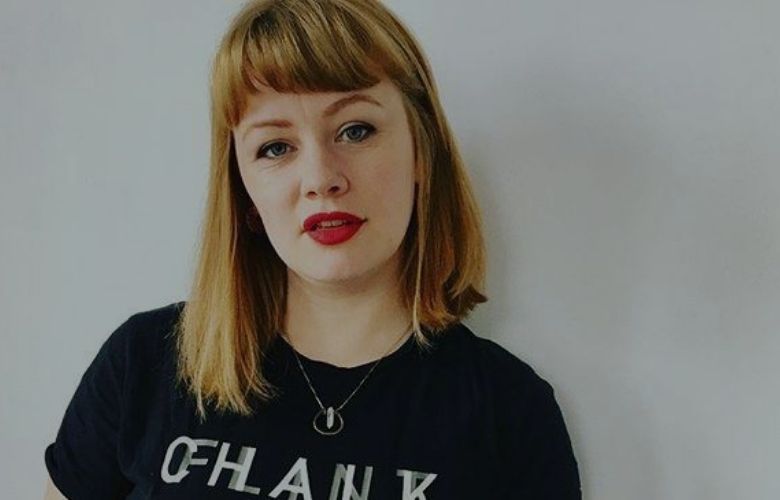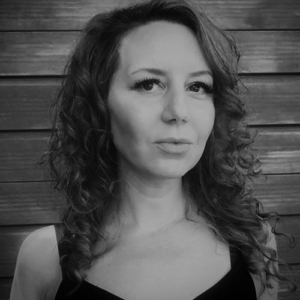
Isobel Anderson is a Hastings based musician, sonic artist and academic. She teaches music production, songwriting and professional development at some of London’s leading industry colleges, such as The Institute of Contemporary Music and BIMM, London. She has self-released and self-produced four albums, which have gone on to amass over 25 million Spotify streams and has performed at Glastonbury festival. She also holds a PhD in Sonic Arts from Belfast’s Sonic Arts Research Centre and is the founder of The Female DIY Musician, which is an online resource helping womxn start recording and releasing their music.
I reluctantly got into music when I started singing in choirs and school productions. I say reluctantly because I loved anything artistic and had, till then, wanted to be a visual artist (yeah, at 10yrs old?). Throughout my teenage years, I learned that singing and songwriting were the most effortless, freeing and rewarding ways I could express myself and that, fundamentally, I was feeling my way through the world through my voice, sound and song.
I also had dyslexia growing up, and in the 90’s that wasn’t really picked up in verbally articulating kids. I was very frustrated and ashamed at my inability to excel academically: spelling felt like an alien concept; music was effortless. By the time I left school, there was no other way I could imagine spending my time here on this planet other than being a musician.
Without a doubt, it has to be all the time and opportunities I’ve had to explore my craft. Most people might think of specific live gigs or moments when they heard their music on the radio, and these things are wonderful.
But there is nothing more fortunate and priceless than actually having time to play, develop and reflect on your creative process and output.
Whether it be songwriting, field recording or making a music video, this has been a gift that nothing else can ever replace.
Definitely that you must always follow that quiet, wise, inner voice of your gut – it’s never wrong when it tells you how you’ll never enjoy working with someone who creeps you out, that you feel totally overwhelmed and need a break or not to say “yes” when you actually feel “no!”
I would advise any budding musician reading this to get started before you’re ready. When I look back over my career to-date, if I hadn’t stopped waiting for a record company to come along and ‘make it all OK’ I would never have self-released my music and seen the success it’s had, so far.
I wasn’t ready to record or release my music in any professional sense, but I was ready on a personal level.
I was ready because I knew if I didn’t get my music out, I’d deeply, deeply regret it.
That’s literally all you need to feel to know it’s time to take that leap and learn an instrument, record those songs or get that album out into the world, however small or big that looks.
My thoughts are very much with those artists and performers who have been affected by lockdown, as I know for many it has been a very difficult time. I, myself, have actually not been affected too badly as I stepped away from live gigs over the last few years due to suffering with chronic pain. This is why I am now focussed more on teaching and making online resources for womxn in music.
If anything, I’ve actually really enjoyed getting more time at home and building stronger relationships online with all the wonderful female musicians inside my online learning communities. Without COVID I don’t think I’d have had the bandwidth to run Home Recording Academy as a BETA this Spring, so that has actually felt like a massive silver lining.
Yes, if there are any musicians reading this and struggling financially right now, they should definitely check out these grants:
I launched The Female DIY Musician, which is an online resource helping womxn start recording and releasing their music. We have a free, thriving Facebook group with over 550 members from all over the world where I regularly share trainings and resources and this September I’ll also be launching my new, female-focussed, signature course, Home Recording Academy.
Having even just basic recording skills is without a doubt essential for every musician nowadays in order to thrive in the industry.
Still, though, many womxn find it hard to develop these skills, for a variety of reasons. And so, Home Recording Academy was born and after a successful BETA launch this Spring, I’ll be launching the programme publicly with two scholarships for one BAME and one disabled identifying musician.
I am so excited to be opening the doors to Home Recording Academy in September this year. The BETA run was so incredibly successful that I just can’t wait to meet a whole new bunch of female+ musicians, get creative with home recording together and so much more ready to release their music. While the course isn’t enrolling right now, you can join the wait list here if this sounds exactly what you need right now.
I’m also getting started in my role as the ‘Major Production Project’ Module Leader on ICMP’s new Creative Music Production MA, which starts in September this year and is shaping up to be a wonderful programme.
If you’re a female identifying musician and you’d like to learn more about recording and releasing your music, head over to The Female DIY Musician where you’ll find loads to get you started.
If you know you’d like to start making recordings from home, take a look at Isobel’s FREE 3-Step Guide to Sound Treating Your Home Recording Space.
And if you want to check out Isobel’s music, you can listen on Spotify here.
Louise Golbey: Interview With A London Based Musician
Sophia Dalton: Interview with a London based Stage Manager


Michelle is a musician and composer from the UK. She has performed across the UK and Europe and is passionate about arts education and opportunities for women and girls.
Read Full Profile© 2021 TheatreArtLife. All rights reserved.

Thank you so much for reading, but you have now reached your free article limit for this month.
Our contributors are currently writing more articles for you to enjoy.
To keep reading, all you have to do is become a subscriber and then you can read unlimited articles anytime.
Your investment will help us continue to ignite connections across the globe in live entertainment and build this community for industry professionals.